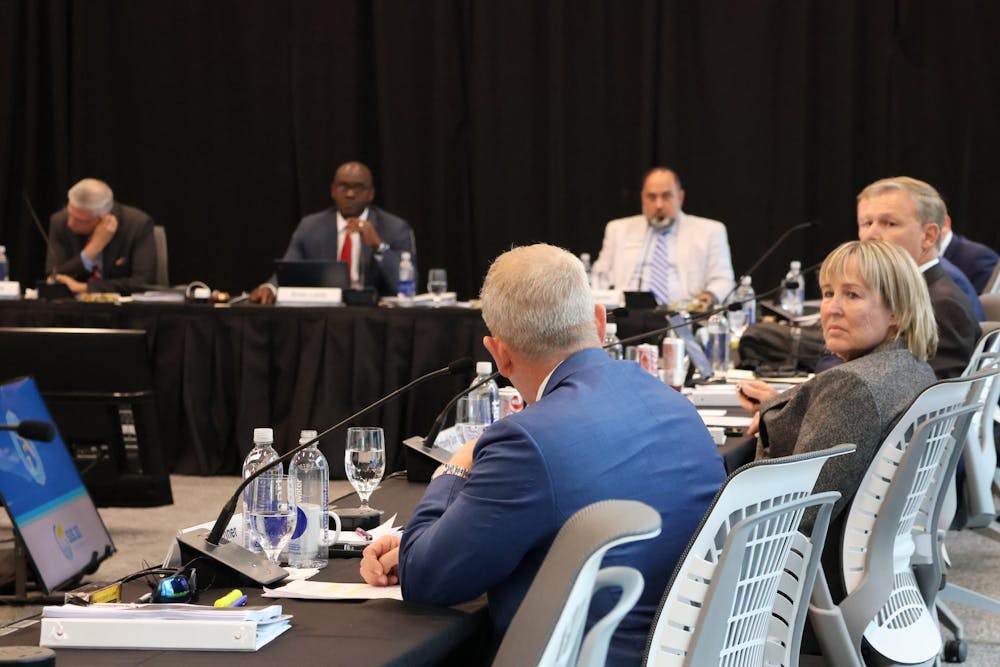Correction: This story has been updated to reflect Michael Okun's proper title.
The Board of Governors rejected the sole finalist of the University of Florida presidential search, Santa J. Ono, in a 10-6 vote, a first in Florida public university history.
The search started in January, following the vacancy left by Ben Sasse’s abrupt resignation in July 2024. Ono was announced as the sole finalist in the presidential search May 4 due to his administrative experience from serving as the president of three universities: the University of British Columbia, the University of Cincinnati and the University of Michigan.
Ono worked tirelessly to prove he was in line with Florida’s conservative values. He closed DEI offices during his presidency at U-M and promised to embrace “institutional neutrality,” but it wasn’t enough.
The 17-member Board of Governors, 14 of whom were appointed by Gov. Ron DeSantis, questioned him about diversity programs, antisemitism, gender views and other topics Ono has been grilled on since being announced as a candidate for UF’s presidency.
The board interrogated him for nearly four hours. Members questioned Ono about his past statements, many of them unsure if Ono truly changed his beliefs.
Criticism from the right
Following Ono’s candidacy announcement, several prominent conservatives criticized his past comments on issues like diversity, equity and inclusion, and questioned his ability to lead UF.
Christopher Rufo, a New College of Florida board member appointed by DeSantis, encouraged the Board of Governors to restart its search in an article published the same day the UF Board of Trustees confirmed Ono.
“Woke is threatening a return to power,” Rufo wrote.
He cited Ono’s past affirmation for climate justice, DEI and Ono’s inclusion of gender pronouns on his Instagram profile as marks against his conservative credentials.
“The University of Florida deserves better than a president who, throughout his career, has sounded more like Ibram X. Kendi and Greta Thunberg than Ron DeSantis and Ben Sasse,” Rufo said.
Florida Rep. Greg Steube (R-17) also urged Ono’s rejection in a letter he sent to the Board of Governors.
Florida Congressman Byron Donalds said the search committee needs to go back to the drawing board.
Sen. Rick Scott (R-FL) and Rep. Jimmy Patronis (R-1) joined the opposition against Ono just a day before the Board of Governors vote.
The backlash reached a national level when Donald Trump Jr. described Ono as a “woke psycho” on X.
Prominent conservative activist Andy Ngo also took to the app to criticize Ono, writing that the candidate represents “a threat to freedom of expression.”
Meanwhile, DeSantis has remained relatively silent despite his initial support for Ono’s candidacy.
On May 7, DeSantis said he trusted those involved in the presidential search process. The governor has distanced himself from Ono since then, saying the Board of Governors would have to use its own discretion to judge the president-elect.
He assured the public in a press conference May 29 that no UF president, Ono included, would bring a “woke” agenda to the university.
"We have expectations about what we want in higher education,” DeSantis said. “We don't want it to be a fountain of activism or leftist indoctrination, and if you go in that direction, you won’t have the support to continue."
But the Presidential Search Advisory Committee has defended its decision. UF Board of Trustees Chair Mori Hosseini continued to push for Ono’s approval.
“Santa Ono is precisely the right person to be president of the University of Florida at this moment in its history,” Hosseini said in a May 27 press release.
Hosseini said Ono will “see to it that the University of Florida continues its ascent toward becoming America’s premier public university.”
Ono stressed his support for Florida’s higher education vision and its “decisive move away from ideological bias and activist-driven culture.”
UF’s ranking has fluctuated over the past few years, and Hosseini’s unwavering support of Ono may reflect his personal dedication to keeping UF a top-ranked university.
Hosseini wrote about the importance of UF being ranked No. 5 among public universities in 2021, stating Florida students should be able to get a top-quality college education.
The right candidate could push Florida back to the top after dropping to No. 7 among public universities in the U.S. News & World Report.
Criticism from the left
While Ono faced fire from Florida conservatives, he left U-M with a mixed reputation due to his shift toward right-leaning policies.
He closed DEI offices at U-M in March despite once advocating for inclusivity initiatives. He said the decision stemmed from Florida legislation passed in 2023 to crack down on DEI programs and was made before he was approached about the UF presidency.
It was a decision that angered the student body. Ono was booed during U-M’s Spring 2025 commencement ceremony. He faced backlash from students for his antagonistic relationship with the university’s graduate student union and pro-Palestinian protestors.
He was accused of censoring free speech after proposing significant restrictions on campus protests. His “disruptive activity policy” would create strict punishments for anyone who interrupts official university events.
The presidential search’s closed process wasn’t well-received by UF students and faculty. Some complained the secretive process limited university involvement. On-campus union members also expressed concerns as to what Ono’s union-busting history might mean for them.
Ono before the board
Speakers praised and criticized Ono during the public comment section, which kicked off the Board of Governors meeting Tuesday afternoon.
Joshua Rubin, an assistant professor at the University of Michigan, spoke strongly against Ono. He said the former president failed to protect Jewish students in the aftermath of the October 7 attacks.
Michael Okun, a UF professor and member of the Presidential Search Advisory committee, argued Ono proved himself to be an “ally to the Jewish community.”
Others described Ono as a harbinger of DEI policies or praised him as a well-respected administrator.
Following public comment, UF Board of Trustees Chair Mori Hosseini said critics failed to appreciate the good in Ono.
Ono has the unique combination of ideological alignment and operational experience to run a research institution like UF, Hosseini said.
“Please give Dr. Ono a chance,” he added.
Hosseini compared the president-elect to the political development of figures like Ronald Reagan and Clarence Thomas, who initially supported more liberal ideals before eventually shifting to the right.
After Hosseini spoke, Ono addressed the governors himself. He told the board about his background as a researcher and his experience as the president of three universities.
He wants to emphasize the core themes of his vision for UF, such as attracting and retaining global talent and securing national leadership through expanded competitive funding, he said.
He addressed concerns about his actions in response to the October 7 attack, his past support of DEI and his stance on climate change. Ono emphasized his attitudes have changed and said he’s committed to aligning himself with DeSantis’ values.
“I want to come to Florida not to slow reform, but to accelerate it with every ounce of energy that I have,” Ono said.
Following Ono’s speech, the Board of Governors began questioning Ono, heavily focusing on DEI. The board also addressed his stances on gender identity, racism and his previous statements.
The meeting grew heated. At one point, Hosseini said Board of Governors member Paul Renner had also been considered as a presidential candidate, leading Renner to defend himself.
Many board members questioned how Ono could change his thinking so drastically in a short amount of time. Ono had claimed he changed his views on DEI in just 18 months, and he tirelessly reassured the board about the shift.
The scene looked like a trial. Board members like Paul Renner grilled Ono on statements he had made about DEI 2.0.
The room was tense as board members argued about whether it was fair to question Ono on material from as far back as 2010, which hadn’t been given to Ono until the day of the meeting.
Ono repeatedly said he had evolved in his views on issues such as valuing meritocracy in college admissions as opposed to using race as a factor.
He routinely distanced himself from statements that had come out in favor of DEI throughout his presidency, and he said they came from an array of U-M leadership.
Ono made a point to emphatically praise Florida’s education mission and some of its flagship projects, like the Hamilton Center.
He dodged questions about racism, decolonization and whiteness, which persisted from board members such as Carson Good and Jose Oliva.
“I’m not an expert,” Ono said in response to questions about how he defines whiteness and racism.
The vote
The board failed to approve a motion to make Ono UF’s next president in a 6-to-10 vote, with one member, Craig Mateer, absent.
Governor Good said the “philosophical distance was too far.”
Ono quickly left the room. Board of Governors members did the same.
Santa won’t be coming to town
He resigned from his role as president of U-M days after being announced as UF’s sole finalist, despite the U-M Board of Regents extending his contract until 2032. His former contract included a base salary increase to $1.3 million per year.
In contrast, UF would have paid him a base salary of $1.5 million per year.
It is unclear what Ono will do next, but he isn’t the only one who has to make new plans. UF still needs a permanent president, which means the Presidential Search Advisory Committee will have to begin its process over again to select a new candidate.
The Board of Governors heeded Rufo’s call; it hit “restart.” Now they’re back to the drawing board.
Contact Maria Avlonitis at mavlonitis@alligator.org. Follow her on X @MariaAvlonitis.
Koushin Unber and Avery Parker contributed to this report.

Maria is the Fall 2025 university editor of the Alligator. She previously worked as the university administration reporter Summer 2025. Maria enjoys walking her dog, and on the rare occassion she has free time, she loves attempting to garden and salsa dancing.






